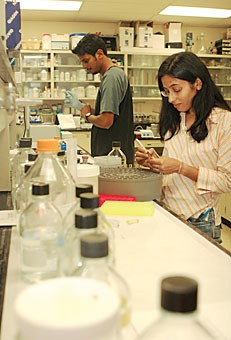Although university officials said international graduate students are key to the university, graduate students at the UA are not given the same benefits as students at some peer institutions.
Graduate assistants or associates, who are in research or instruction, are guaranteed an 80 percent tuition waiver in exchange for working at the UA.
Many other universities offer full tuition waivers in addition to stipends, however, according to the Chronicle of Higher Education Web site.
Amanda Brobbel, a graduate student in English literature from Canada, said that because she is not eligible for U.S. financial aid, she must work both on and off campus. Brobbel said she has two jobs, is an events director for the Graduate and Professional Student Council and a community resident assistant and must get support where she can find it.
“”The (Canadian) dollar doesn’t go as far here,”” said Brobbel, who initially came to the UA to be with her husband.
However, in addition to the tuition waiver, graduate assistants in the department of biochemistry also earn a stipend of approximately $23,000 plus health insurance benefits, said Elizabeth Vierling, a biochemistry and molecular biophysics professor.
The department wants research assistants to have a minimum of $20,000 to take home after fees to cover living expenses, Vierling said.
But the compensation for such work is not the same across the university and is often inadequate to support graduate students, said Claudia Salgado, a graduate student in Spanish from Mexico City.
Salgado said she doesn’t have cable television and when she wants to use the Internet, she must bike 3 1/2 miles each way to the UA, and she rarely uses her car due to high gas prices.
Still, the university values international students for both their cultural and academic contributions, said Kirk Simmons, UA’s executive director of international affairs.
Simmons said the academic quality of UA programs are sustained by international graduate students, therefore these students are actively recruited by the university.
“”When you’re maintaining high-quality graduate programs, you must continue to recruit the best and brightest in the world,”” said Simmons, who cited research as one of the top international student contributions.
The UA was recently ranked 21st in the nation for research by the National Science Foundation, having spent nearly $500 million on its endeavors.
Of the UA’s 2,446 international students from the 2005-2006 school year, 1,612 are graduate students, according to the UA Factbook. There were 1,312 research assistantships available last year to all graduate students on campus.
“”In general, many of the international graduate students are very well-trained,”” Vierling said.
The students are also highly motivated, considering the challenges in pursuing graduate education in another country, Vierling said.
Salgado said she came to the UA in particular for its Spanish concentration in border studies after “”no one shared all the things I had in my mind”” back home.
Leandro Carrera, a graduate student in political science from Argentina, said Argentinian students come to the U.S. because of the lack of resources in their home country.
The education is free but due to tuition costs, universities there often lack educational resources like computers, Carrera said.
Vierling, who works with three international graduate research assistants, believes that having a mixture of nationalities is a great learning experience for everyone.
“”It broadens everyone’s perspective,”” Vierling said. “”(And) you can have great potluck dinners.””









